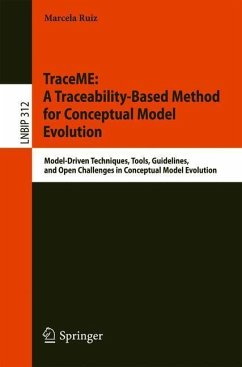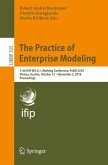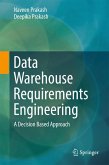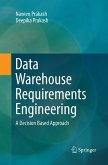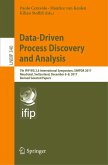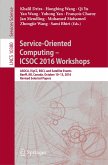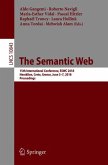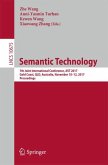Marcela Ruiz
TraceME: A Traceability-Based Method for Conceptual Model Evolution
Model-Driven Techniques, Tools, Guidelines, and Open Challenges in Conceptual Model Evolution
Marcela Ruiz
TraceME: A Traceability-Based Method for Conceptual Model Evolution
Model-Driven Techniques, Tools, Guidelines, and Open Challenges in Conceptual Model Evolution
- Broschiertes Buch
- Merkliste
- Auf die Merkliste
- Bewerten Bewerten
- Teilen
- Produkt teilen
- Produkterinnerung
- Produkterinnerung
This book presents TraceME, a traceability-based method for conceptual model evolution whose general purpose is to support the evolution of information systems. By providing a set of four TraceME chunks, TraceME is situational-oriented. In this way, it can be adapted to support different evolution projects by just assembling the TraceME chunks. To facilitate its industrial adoption, open source tools were developed and described which support the implementation of the TraceME chunks. The work presented highlights various research endeavors for the development of methods and techniques to…mehr
Andere Kunden interessierten sich auch für
![The Practice of Enterprise Modeling The Practice of Enterprise Modeling]() The Practice of Enterprise Modeling39,99 €
The Practice of Enterprise Modeling39,99 €![Data Warehouse Requirements Engineering Data Warehouse Requirements Engineering]() Naveen PrakashData Warehouse Requirements Engineering66,99 €
Naveen PrakashData Warehouse Requirements Engineering66,99 €![Data Warehouse Requirements Engineering Data Warehouse Requirements Engineering]() Naveen PrakashData Warehouse Requirements Engineering47,99 €
Naveen PrakashData Warehouse Requirements Engineering47,99 €![Data-Driven Process Discovery and Analysis Data-Driven Process Discovery and Analysis]() Data-Driven Process Discovery and Analysis39,99 €
Data-Driven Process Discovery and Analysis39,99 €![Service-Oriented Computing - ICSOC 2016 Workshops Service-Oriented Computing - ICSOC 2016 Workshops]() Service-Oriented Computing - ICSOC 2016 Workshops39,99 €
Service-Oriented Computing - ICSOC 2016 Workshops39,99 €![The Semantic Web The Semantic Web]() The Semantic Web40,99 €
The Semantic Web40,99 €![Semantic Technology Semantic Technology]() Semantic Technology39,99 €
Semantic Technology39,99 €-
-
-
This book presents TraceME, a traceability-based method for conceptual model evolution whose general purpose is to support the evolution of information systems. By providing a set of four TraceME chunks, TraceME is situational-oriented. In this way, it can be adapted to support different evolution projects by just assembling the TraceME chunks. To facilitate its industrial adoption, open source tools were developed and described which support the implementation of the TraceME chunks.
The work presented highlights various research endeavors for the development of methods and techniques to automate the evolution of software systems. It explores the requirements engineering field as a steppingstone to a successful software development processes. In 2017, the underlying PhD dissertation won the "CAiSE PhD award", granted to outstanding PhD theses in the field of Information Systems Engineering.
The work presented highlights various research endeavors for the development of methods and techniques to automate the evolution of software systems. It explores the requirements engineering field as a steppingstone to a successful software development processes. In 2017, the underlying PhD dissertation won the "CAiSE PhD award", granted to outstanding PhD theses in the field of Information Systems Engineering.
Produktdetails
- Produktdetails
- Lecture Notes in Business Information Processing 312
- Verlag: Springer / Springer International Publishing / Springer, Berlin
- Artikelnr. des Verlages: 978-3-319-89715-8
- 1st edition 2018
- Seitenzahl: 292
- Erscheinungstermin: 1. Mai 2018
- Englisch
- Abmessung: 235mm x 155mm x 16mm
- Gewicht: 447g
- ISBN-13: 9783319897158
- ISBN-10: 3319897152
- Artikelnr.: 51849637
- Herstellerkennzeichnung Die Herstellerinformationen sind derzeit nicht verfügbar.
- Lecture Notes in Business Information Processing 312
- Verlag: Springer / Springer International Publishing / Springer, Berlin
- Artikelnr. des Verlages: 978-3-319-89715-8
- 1st edition 2018
- Seitenzahl: 292
- Erscheinungstermin: 1. Mai 2018
- Englisch
- Abmessung: 235mm x 155mm x 16mm
- Gewicht: 447g
- ISBN-13: 9783319897158
- ISBN-10: 3319897152
- Artikelnr.: 51849637
- Herstellerkennzeichnung Die Herstellerinformationen sind derzeit nicht verfügbar.
1.1 Problem statement.- 1.2 Research method.- 1.2.1 Research goals and research questions.- 1.2.2 Engineering, design and empirical cycles.- 1.3 Means to achieve the main research goal.- 1.4 The TraceME method in a nutshell.- 1.5 Outline of the book.- 2.1 Traceability in conceptual model evolution.- 2.2 Measuring conceptual models evolution .- 2.3 Model-driven organisational reengineering frameworks.- 2.4 Goal-driven requirements engineering.- 2.5 Evolution requirements and information system co-evolution.- 2.6 TraceME and related MDD solutions.- 2.7 Summary.- 3.1 The basics.- 3.2 A theoretical framework for model-driven development.- 3.3 A theoretical framework for organisational reengineering.- 3.4 Summary.- 4.1 Introduction.- 4.2 Background and running example.- 4.2.1 The i* framework in a nutshell.- 4.2.2 The Communication Analysis method in a nutshell.- 4.3 The GoBIS framework .- 4.3.1 Research Method.- 4.3.2 Modelling language integration.- 4.3.3 Ontological mapping between i* and CA.- 4.3.4 Metamodel integration: the GoBIS metamodel.- 4.4 iStar2ca guidelines: top-down scenario guidelines.- 4.5 evolCA procedure: evolution scenario procedure.- 4.6 ca2oom integration framework. -4.7 Delta analysis.- 4.7.1 Delta models specification.- 4.7.2 Delta models measurement.- 4.7.3 Delta models and metrics interpretation report.- 4.7.4 Delta analysis metamodel.- 4.8 Summary.- 5.1 Motivation.- 5.2 TraceME method: the construction.- 5.3 A method engineering effort to construct TraceME.- 5.4 The TraceME Method.- 5.4.1 Introduction.- 5.4.2 Perspective.- 5.4.3 Framework.- 5.4.4 Cooperation principles.- 5.5 Method chunk iStar2ca guidelines.- 5.5.1 Concepts.- 5.5.2 Procedure.- 5.5.3 Notation.- 5.6 Method chunk ca2oom integration framework.- 5.6.1 Concepts.- 5.6.2 Procedure.- 5.6.3 Notation.- 5.7 Method chunk evolCA procedure.- 5.7.1 Concepts.- 5.7.2 Procedure.- 5.7.3 Notation.- 5.8 Method chunk Delta Analysis.- 5.8.1 Concepts.- 5.8.2 Procedure.- 5.8.3 Notation.- 5.9 Situational-oriented assembling of the TraceME chunks.- 5.10 Summary.- 6.1 Introduction. -6.2 Validation of the iStar2ca guidelines - a laboratory demonstration and comparative experiment .- 6.2.1 Laboratory demonstration.- 6.2.2 Comparative experiment.- 6.3 Validation of the Delta Analysis technique: Action research experience in everis Spain.- 6.3.1 Design of the action research in everis.- 6.3.2 Discussion.- 6.4 Validation of the ca2oom integration framework: an experiment for sensitive analysis.- 6.4.1 Experimental design.- 6.4.2 Experimental procedure.- 6.4.3 Conclusions and lessons learnt.- 6.5 Validation of the evolCA procedure: A feasibility analysis .- 6.5.1 Design and procedure.- 6.5.2 Conclusions and lessons learnt.- 6.6 Summary.- 7.1 Introduction.- 7.2 The GREAT Process Modeller.- 7.3 Plug-in for the GoBIS framework.- 7.4 Plug-in the Delta Analysis technique.- 7.5 Summary.- 8.1 Wrap up: main contributions.- 8.2 Open challenges.
1.1 Problem statement.- 1.2 Research method.- 1.2.1 Research goals and research questions.- 1.2.2 Engineering, design and empirical cycles.- 1.3 Means to achieve the main research goal.- 1.4 The TraceME method in a nutshell.- 1.5 Outline of the book.- 2.1 Traceability in conceptual model evolution.- 2.2 Measuring conceptual models evolution .- 2.3 Model-driven organisational reengineering frameworks.- 2.4 Goal-driven requirements engineering.- 2.5 Evolution requirements and information system co-evolution.- 2.6 TraceME and related MDD solutions.- 2.7 Summary.- 3.1 The basics.- 3.2 A theoretical framework for model-driven development.- 3.3 A theoretical framework for organisational reengineering.- 3.4 Summary.- 4.1 Introduction.- 4.2 Background and running example.- 4.2.1 The i* framework in a nutshell.- 4.2.2 The Communication Analysis method in a nutshell.- 4.3 The GoBIS framework .- 4.3.1 Research Method.- 4.3.2 Modelling language integration.- 4.3.3 Ontological mapping between i* and CA.- 4.3.4 Metamodel integration: the GoBIS metamodel.- 4.4 iStar2ca guidelines: top-down scenario guidelines.- 4.5 evolCA procedure: evolution scenario procedure.- 4.6 ca2oom integration framework. -4.7 Delta analysis.- 4.7.1 Delta models specification.- 4.7.2 Delta models measurement.- 4.7.3 Delta models and metrics interpretation report.- 4.7.4 Delta analysis metamodel.- 4.8 Summary.- 5.1 Motivation.- 5.2 TraceME method: the construction.- 5.3 A method engineering effort to construct TraceME.- 5.4 The TraceME Method.- 5.4.1 Introduction.- 5.4.2 Perspective.- 5.4.3 Framework.- 5.4.4 Cooperation principles.- 5.5 Method chunk iStar2ca guidelines.- 5.5.1 Concepts.- 5.5.2 Procedure.- 5.5.3 Notation.- 5.6 Method chunk ca2oom integration framework.- 5.6.1 Concepts.- 5.6.2 Procedure.- 5.6.3 Notation.- 5.7 Method chunk evolCA procedure.- 5.7.1 Concepts.- 5.7.2 Procedure.- 5.7.3 Notation.- 5.8 Method chunk Delta Analysis.- 5.8.1 Concepts.- 5.8.2 Procedure.- 5.8.3 Notation.- 5.9 Situational-oriented assembling of the TraceME chunks.- 5.10 Summary.- 6.1 Introduction. -6.2 Validation of the iStar2ca guidelines - a laboratory demonstration and comparative experiment .- 6.2.1 Laboratory demonstration.- 6.2.2 Comparative experiment.- 6.3 Validation of the Delta Analysis technique: Action research experience in everis Spain.- 6.3.1 Design of the action research in everis.- 6.3.2 Discussion.- 6.4 Validation of the ca2oom integration framework: an experiment for sensitive analysis.- 6.4.1 Experimental design.- 6.4.2 Experimental procedure.- 6.4.3 Conclusions and lessons learnt.- 6.5 Validation of the evolCA procedure: A feasibility analysis .- 6.5.1 Design and procedure.- 6.5.2 Conclusions and lessons learnt.- 6.6 Summary.- 7.1 Introduction.- 7.2 The GREAT Process Modeller.- 7.3 Plug-in for the GoBIS framework.- 7.4 Plug-in the Delta Analysis technique.- 7.5 Summary.- 8.1 Wrap up: main contributions.- 8.2 Open challenges.

